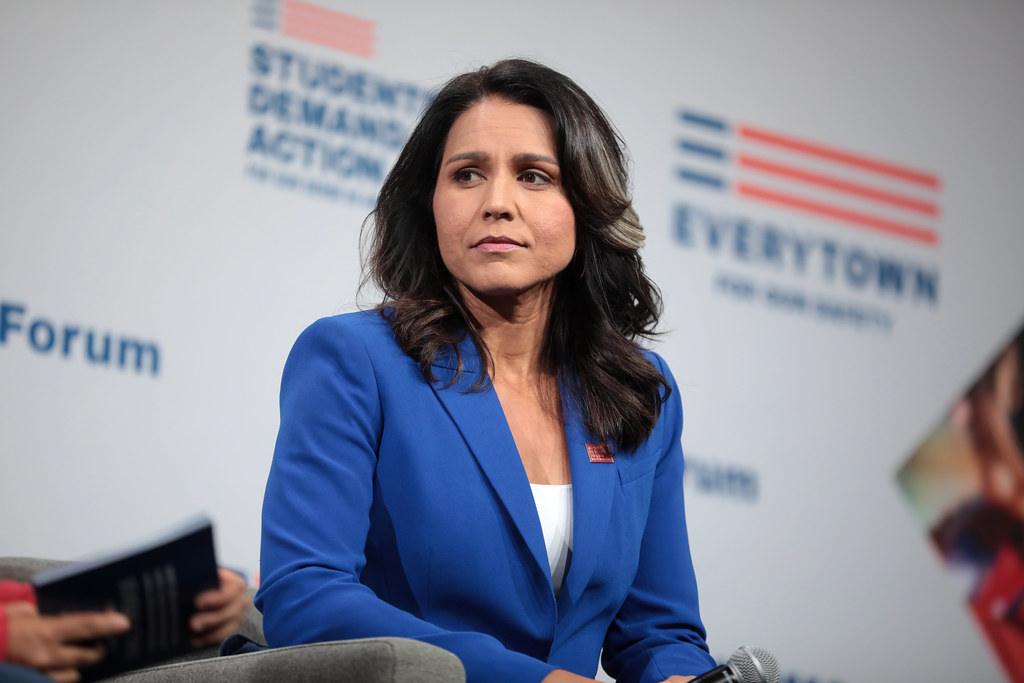In the grand theater of American politics, where logic takes a back seat to spectacle, President-elect Donald Trump has gifted us yet another head-scratcher. His nominee for Director of National Intelligence is none other than Tulsi Gabbard. You know, Tulsi. The former Democratic Congresswoman from Hawaii who served in the House for eight years, left the Democratic Party in a blaze of frustration, and then decided to moonwalk straight into Trump’s inner circle. Because why not?
This nomination is like opening a box of donuts only to find kale chips. Sure, they’re edible, but they’re not what you ordered, and they sure as hell don’t belong in the box.
Military Experience: The Resume Everyone’s Touting
Let’s start with the obvious: Tulsi served in the Hawaii Army National Guard. She deployed to Iraq and Kuwait and earned a Combat Medical Badge. That’s great. Truly. But being a capable medic doesn’t automatically qualify you to oversee 18 intelligence agencies. It’s like saying, “Hey, I’m great at putting Band-Aids on bullet wounds, so let me handle the nuclear codes.”
This isn’t to diminish her service; it’s to point out the gaping canyon between field experience and intelligence leadership. Managing intelligence isn’t about dodging bullets—it’s about navigating a labyrinth of espionage, counterintelligence, and geopolitics without setting the world on fire.
Her Political Evolution: The Hokey Pokey of Ideology
Gabbard’s political trajectory is less a journey and more a game of Twister. She starts on the Democratic side, backing Bernie Sanders, and then proceeds to spend the next few years baffling her party with decisions that made even her supporters whisper, “What is she doing?” She leaves the Democrats, citing corruption and woke politics, and then cozies up to Trump’s orbit. And now, here we are, watching her get tapped for a key role in his administration. Her political ideology is a kaleidoscope: spin it, and you’ll see something new every time.
This unpredictability might make her intriguing as a dinner guest, but as DNI? We need a steady hand, not someone whose next move is as predictable as a cat’s.
Foreign Policy: A Mixed Bag of WTF
If Gabbard’s career were a mixtape, her foreign policy positions would be the tracks you skip. Let’s start with the infamous meeting with Syrian dictator Bashar al-Assad. She justified it as an attempt to seek peace. Admirable, sure. But when your peace-seeking involves shaking hands with a guy accused of chemical warfare, the optics aren’t great.
Then there’s her stance on U.S. involvement in foreign conflicts. She’s consistently criticized American interventionism, which is fine—until it veers into a blind spot for authoritarian regimes. Her views on Islamic extremism and her call to avoid another Cold War with Russia paint her as someone trying to straddle a tightrope over a pit of contradictions.
We’re left wondering: does she see the bigger picture, or is she just doodling in the margins?
Trump’s Choice: The Logic of Chaos
Let’s take a moment to unpack why Trump might choose Gabbard. She’s not exactly beloved by the Democratic establishment—she’s practically their black sheep. For Trump, that’s a win. Nominate someone who makes his opponents squirm, and you’ve already scored points. Add her military background and outsider status, and she fits the mold of Trump’s “drain the swamp” rhetoric. But here’s the problem: draining the swamp doesn’t mean hiring someone who has never swum in it.
This isn’t an anti-establishment move; it’s a Mad Lib where “Director of National Intelligence” was filled in at random.
The Intelligence Community: Rolling Their Eyes Hard Enough to Pull a Muscle
The men and women who actually work in intelligence—folks who have spent decades analyzing threats, decoding signals, and running covert operations—must be collectively groaning. Imagine dedicating your life to a field only to have a political wildcard dropped in as your boss. It’s like being a Michelin-star chef and getting a manager who thinks seasoning begins and ends with ketchup.
Concerns abound over her lack of experience and controversial views. The DNI isn’t just a figurehead; it’s the person who ensures that the CIA, NSA, FBI, and others work together to protect national security. This isn’t the place for on-the-job training or ideological experimentation.
Bipartisan Support: A Unicorn in the Wild
Trump claims Gabbard has bipartisan support. Sure, and I’ve got a bridge to sell you. While a handful of Republicans might applaud her military service, most Democrats view her with suspicion, if not outright hostility. Calling her bipartisan is like calling a tornado “a gentle breeze with potential.”
She’s alienated enough people on both sides of the aisle to make her confirmation hearings must-watch TV. Expect fireworks, long-winded speeches, and at least one senator muttering, “Are you serious?” under their breath.
What This Means for America
Here’s the thing: intelligence is one of the most critical aspects of national security. It’s not a ceremonial position or a platform for ideological experiments. It’s serious business that demands expertise, leadership, and the ability to navigate crises without turning them into calamities.
Gabbard might surprise us all and rise to the occasion. But let’s not sugarcoat it: this nomination is a gamble. It’s a roll of the dice with stakes so high they make Vegas look like a charity raffle.
Closing Thoughts: The Show Must Go On
American politics never fails to deliver drama. From left turns to right hooks, it’s a spectacle that leaves us alternately entertained and horrified. Gabbard’s nomination is the latest act in this absurd play. Whether it ends in triumph or disaster, one thing’s for sure: we’ll all be watching with popcorn in hand.



